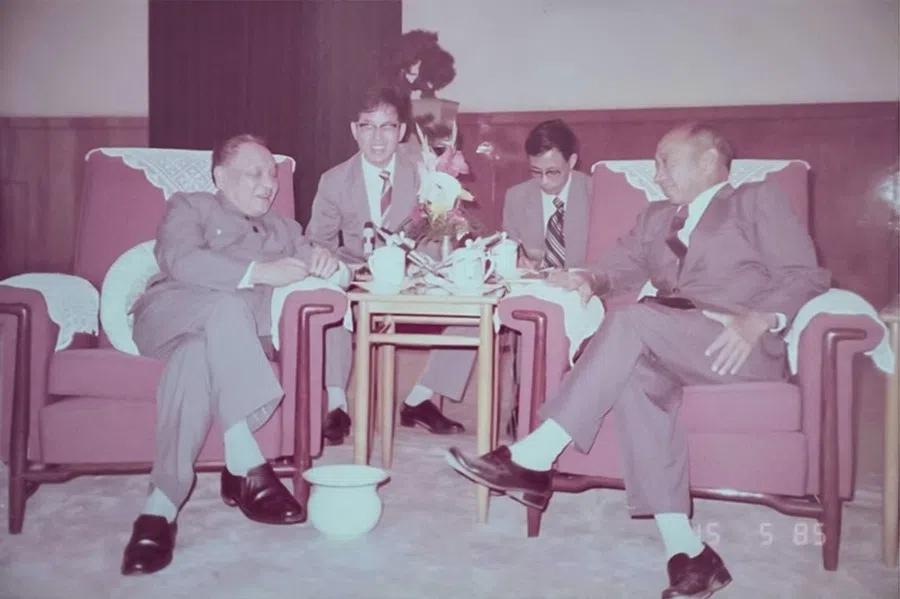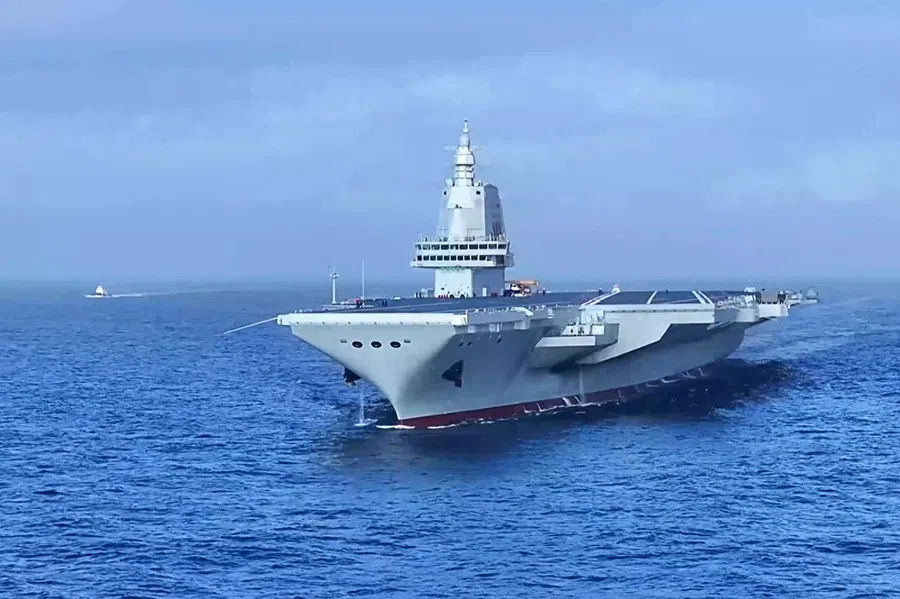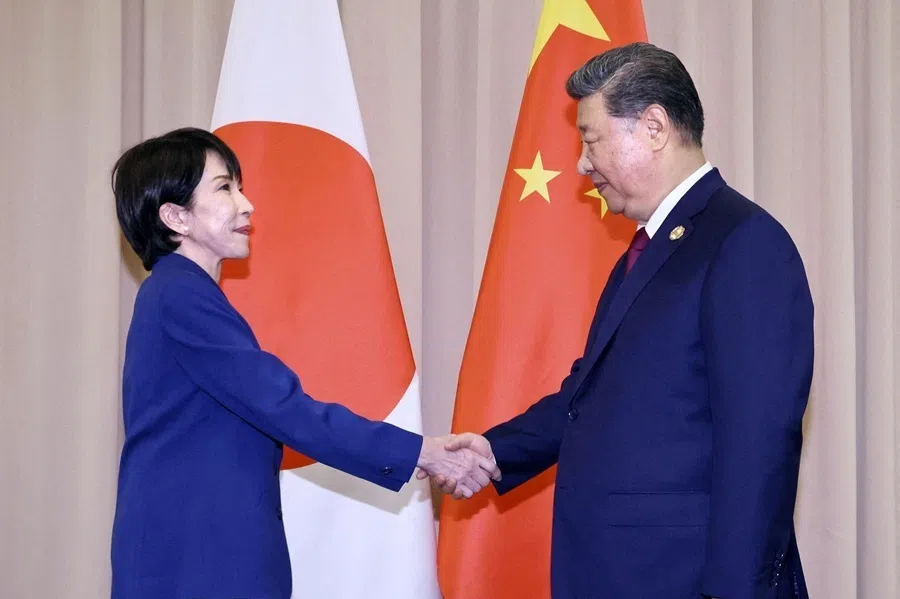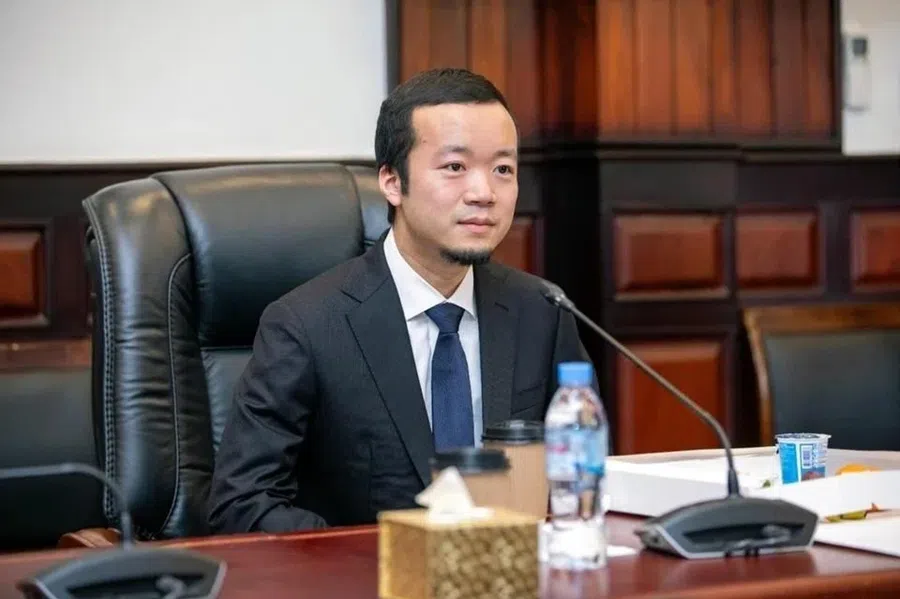Chinese authorities ramp up meetings with foreign industry giants
Lianhe Zaobao journalist Liu Sha takes a closer look at the Chinese authorities' frequent meetings with leaders from multinational companies, in particular those from the manufacturing and biopharmaceutical sectors, following the 20th Party Congress. What do these meetings signal, and will they work in terms of stabilising foreign investor confidence?
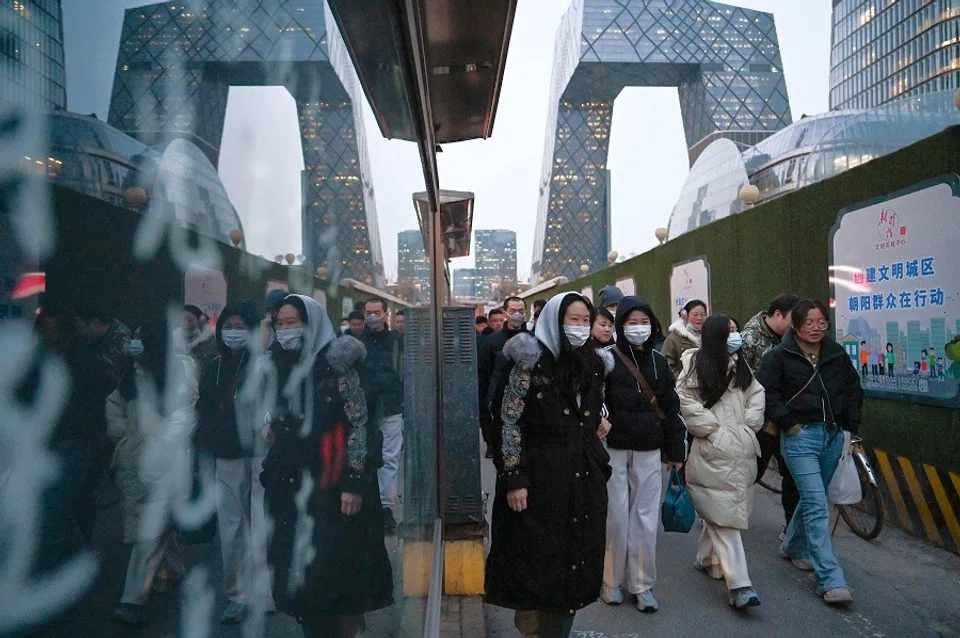
Following the 20th Party Congress of the Chinese Communist Party, senior Chinese leaders have frequently met with executives of multinational corporations (MNCs). Over the past year and a half, there have been significantly more formal meetings held with leaders of MNCs than in the five years following the 19th Party Congress.
Significant increase at the Politburo level
Analysts interviewed noted that amid China's economic slowdown and foreign capital outflow, the increased contact between Chinese senior officials and top executives of MNCs reflects the government's concern about the outflow of foreign capital.
According to what Lianhe Zaobao gleaned from public reports in Chinese official media, from October 2022 after the 20th Party Congress until 1 March this year, Chinese senior officials have held 78 formal meetings with leaders of 60 MNCs.
In comparison, in the five years after the 19th Party Congress in 2017, Chinese senior officials only held 59 formal meetings with leaders of 41 MNCs.
... there has been a surge in visits by MNC executives to China, and various regions and departments in China have stepped up such meetings, reflecting the desire of Chinese leaders... to stabilise foreign capital.

This includes meetings between visiting MNC executives and members of the Politburo Standing Committee, the country's vice-president, or Politburo members who also serve as vice-premiers or party secretaries in Beijing, Shanghai, Tianjin, Chongqing and Guangdong. It also covers video meetings held during the pandemic, but excludes collective meetings.
The increase in contact between Chinese senior officials and MNC executives after the 20th Party Congress is mainly due to a significant increase in meetings between Politburo members who also hold local government positions and top MNC executives. There was no noticeable increase in such meetings at the Politburo Standing Committee level.
Boosting foreign companies' confidence
Academics interviewed pointed out that after the easing of pandemic restrictions, there has been a surge in visits by MNC executives to China, and various regions and departments in China have stepped up such meetings, reflecting the desire of Chinese leaders - especially those directly involved in dealing with foreign investment - to stabilise foreign capital.
Professor Chen Bo, a visiting scholar at Liaoning University, told Lianhe Zaobao that while China stresses the importance of foreign investment at the central level, further communication by local top officials with business leaders demonstrates China's openness to foreign investment, which helps mitigate the economic impact of geopolitical factors.
Tommy Xie, head of research for the Greater China region at OCBC Bank, said when interviewed that the increase in official meetings is a positive signal, but also reflects official concerns about the outflow of foreign capital.

Data from China's State Administration of Foreign Exchange show that in 2023, China's direct investment liabilities (foreign direct investment) increased by US$33 billion, a 81.7% drop compared with 2022, marking the lowest annual level since 1998.
Xie believes that while increased contact between Chinese senior officials and MNC executives helps maintain communication, a stable policy environment and a commitment to economic growth are essential for gaining the trust of foreign companies.
In his government work report in early March this year, Chinese Premier Li Qiang reiterated the need to step up efforts to attract foreign investment, including fully lifting restrictions on foreign investment in the manufacturing sector, easing access to sectors such as telecommunications and healthcare, and normalising measures to rectify policies that violate fair competition between domestic and foreign enterprises.
Compared with after the 19th Party Congress, there has been a significant increase in meetings with manufacturing and biopharmaceutical companies.
Focus on industrial and manufacturing
Among the 60 companies that Chinese senior officials have met with since the 20th Party Congress, most are in the industrial and manufacturing sector, such as Honeywell from the US and Schneider Electric from France.
This is followed by the financial sector, including Bridgewater Associates, J.P. Morgan and Blackstone Group; and then biopharmaceutical and technology companies, such as Moderna from the US, as well as Intel, Tesla and Airbus. Compared with after the 19th Party Congress, there has been a significant increase in meetings with manufacturing and biopharmaceutical companies.
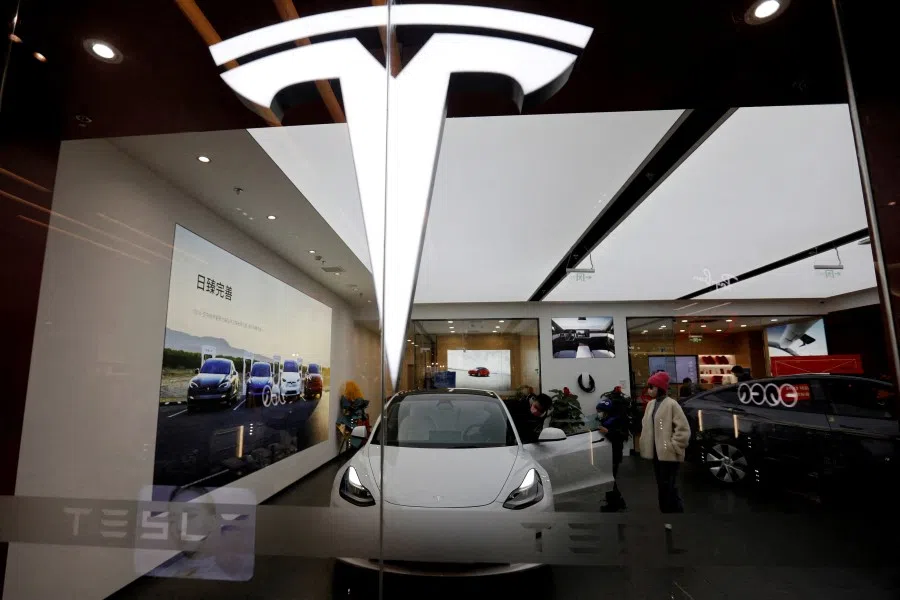
Scholars believe that the industry focus of high-level meetings indicates that the Chinese government is more willing to open these sectors to MNCs, and reflects China's hope that the MNCs can bring relevant capabilities.
Xie assessed that the similarities between integrated manufacturing enterprises such as Thailand's Charoen Pokphand Group, the US's Danaher Corporation and Germany's Bosch lie in the fact that they have an integrated business model, have been operating in China for a long time, have a large investment volume and the ability to create more jobs. Thus, stabilising relations with foreign manufacturing giants will help stabilise China's traditional strengths in the manufacturing sector.
In terms of the distribution by country, be it after the 19th or 20th Party Congress, Chinese senior officials have met most frequently with executives from American companies.
Chen analysed that the large number of visits to China by executives from multinational manufacturing giants also shows that they remain optimistic about China's mature supply chains; stabilising relations with these manufacturing giants will also help resist the US's efforts in decoupling from China.
Chen said that the senior officials' increased meetings with biopharmaceutical companies reflect China's focus on the country's economy and people's livelihoods; this sector is dominated by Europe and the US, and China hopes to strengthen cooperation in it.
Increase in Southeast Asian enterprises
In terms of the distribution by country, be it after the 19th or 20th Party Congress, Chinese senior officials have met most frequently with executives from American companies. Foreign executives visiting China meet with different Chinese leaders, and the enterprises with more repeated visits include Apple, Tesla, General Electric and Volkswagen, most of which are also European and American enterprises.
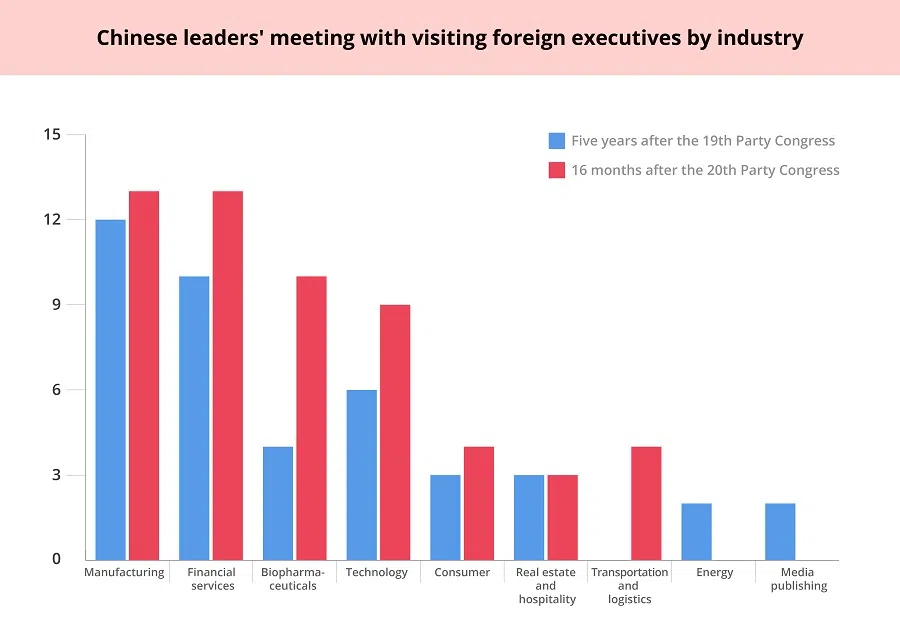
Chen thinks that this is a two-way signal - the fact that executives from big American enterprises are actively visiting China shows that they do not wish to decouple from the country. At the same time, the fact that Chinese leaders are also actively meeting them demonstrates that the Chinese government hopes to safeguard the role that MNCs play in "stabilising" China-US relations.
Also, compared with meetings after the 19th Party Congress, Southeast Asian enterprises are among those that Chinese officials have met with following the 20th Party Congress. Last August, Chinese Premier Li Qiang met with Charoen Pokphand Group senior chair Dhanin Chearavanont in Beijing; on 26 February, Chinese Vice-Premier He Lifeng met with Chinese-Indonesian businessman Sukanto Tanoto, chair of Singapore's Royal Golden Eagle. Chinese leaders have also met with leaders from Singapore's Wilmar International and CapitaLand.
... amid Southeast Asia and China's deepening economic and trade ties and Southeast Asia's growing investment in China, Chinese leaders' decision to meet with entrepreneurs with Chinese backgrounds also highlights the fact that they "share the same clan and origin". - Tommy Xie, Head of research for the Greater China region, OCBC Bank
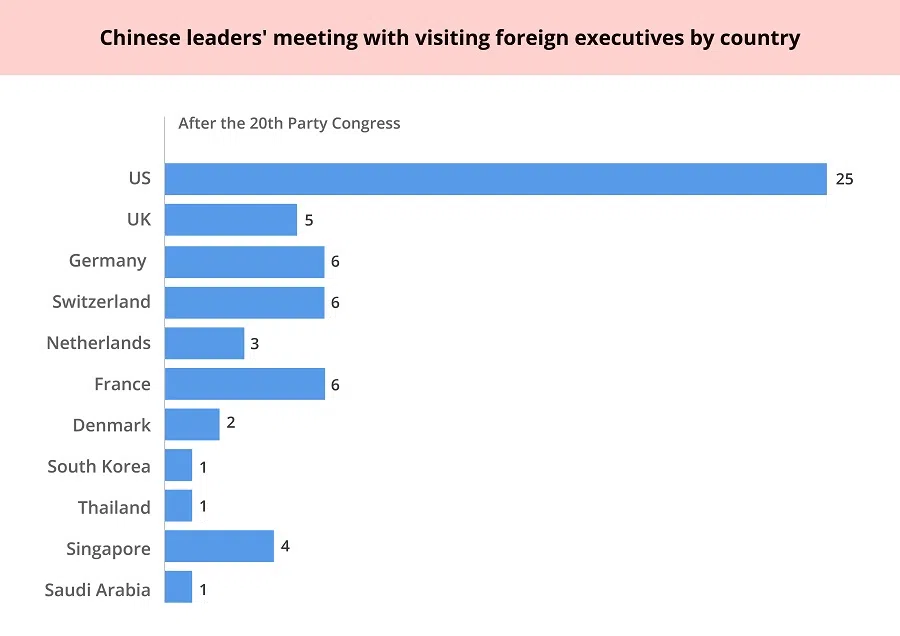
These enterprises have been in the Chinese market for a long time and continue to increase their investment in the country. For example, Royal Golden Eagle founder Tanoto hailed from Putian, Fujian, and entered the Chinese market in the 1980s. At a time when most foreign companies are cautious about increasing their investments in China, this company announced last July an additional investment of 13.7 billion RMB (US$1.9 billion) to expand its paper, clean energy and palm oil businesses in Guangdong.
Xie said that amid Southeast Asia and China's deepening economic and trade ties and Southeast Asia's growing investment in China, Chinese leaders' decision to meet with entrepreneurs with Chinese backgrounds also highlights the fact that they "share the same clan and origin".
This article was first published in Lianhe Zaobao as "二十大后中国高层与跨国企业会面显著增加 分析:对外资流出焦虑".

